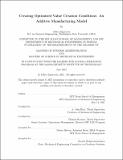Creating Optimized Value Creation Conditions: An Additive Manufacturing Model
Author(s)
Epperson, Jeffrey
DownloadThesis PDF (8.485Mb)
Advisor
Roemer, Thomas
Hart, A. John
Terms of use
Metadata
Show full item recordAbstract
Stryker's additive manufacturing (AM) business unit has pioneered cost competitive Metal AM capabilities at scale. Recently the company has been exploring the possibility of expanding AM capabilities into other materials, processes, and business segments. The opportunities for growth have revealed system limiting factors that are slowing the speed at which the organization is able to create additional value with the technology. This research has proposed a model called the value creation model as a framework for how AM organizations must think about their technological capabilities in the context of organizational maturity. At the center of the value creation model is the amount of value being created for an organization. The variables that determine the level of value that can be created are; business structures & systems, intellectual property protections, competitive advantages, business strategy, and technology development & innovation. In order to create maximum value through AM technology, the technology development and business transformation must happen in parallel. If any of the variables in the value creation model become a limiting factor then the maximum value created for the organization is potentially capped. In the case of the Stryker AM business unit, it is recommended that the organization can increase value creating opportunities by migrating their business model to a wholly-owned subsidiary. This business transformation provides significant value creating opportunities through supply chain efficiencies, simplification of business systems, tax & financial freedom, and opportunities to create sustainable competitive advantages & IP.
Date issued
2021-06Department
Massachusetts Institute of Technology. Department of Mechanical Engineering; Sloan School of ManagementPublisher
Massachusetts Institute of Technology